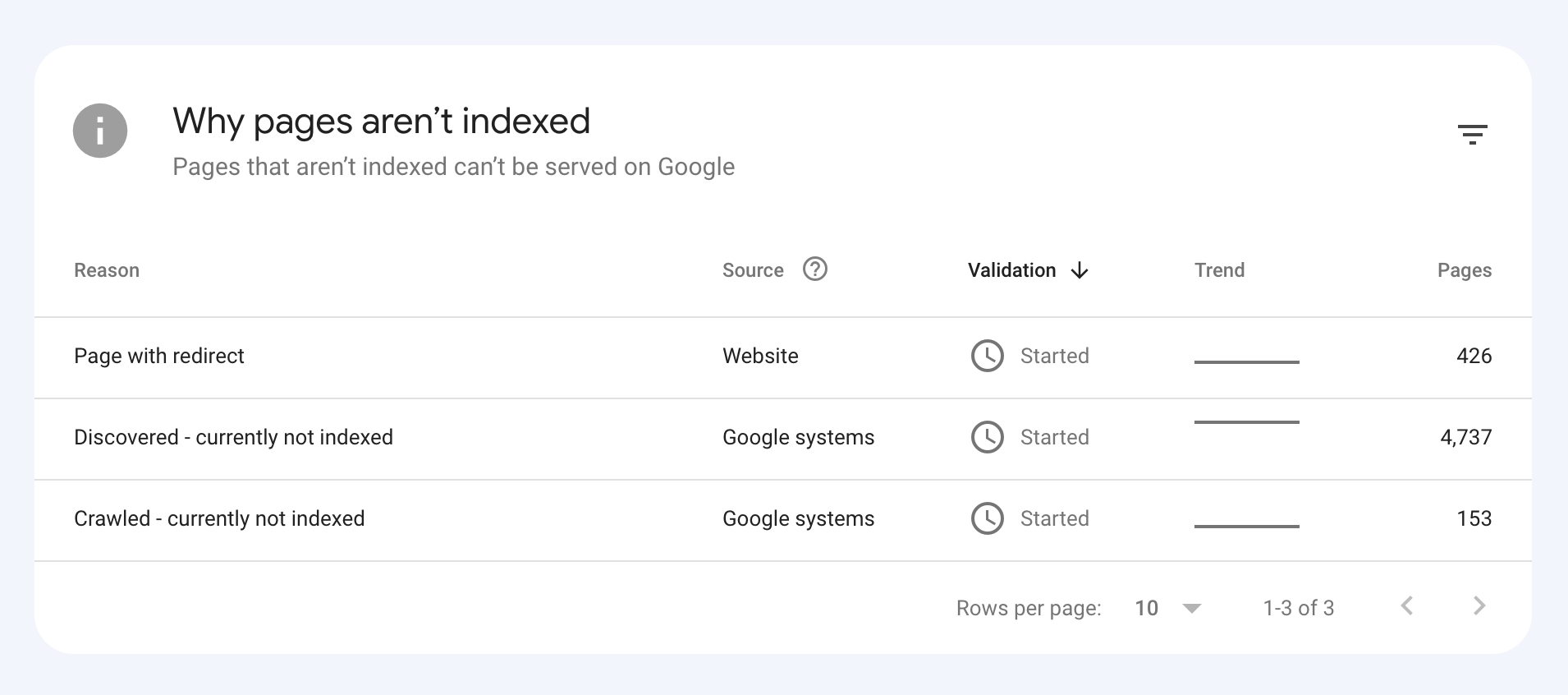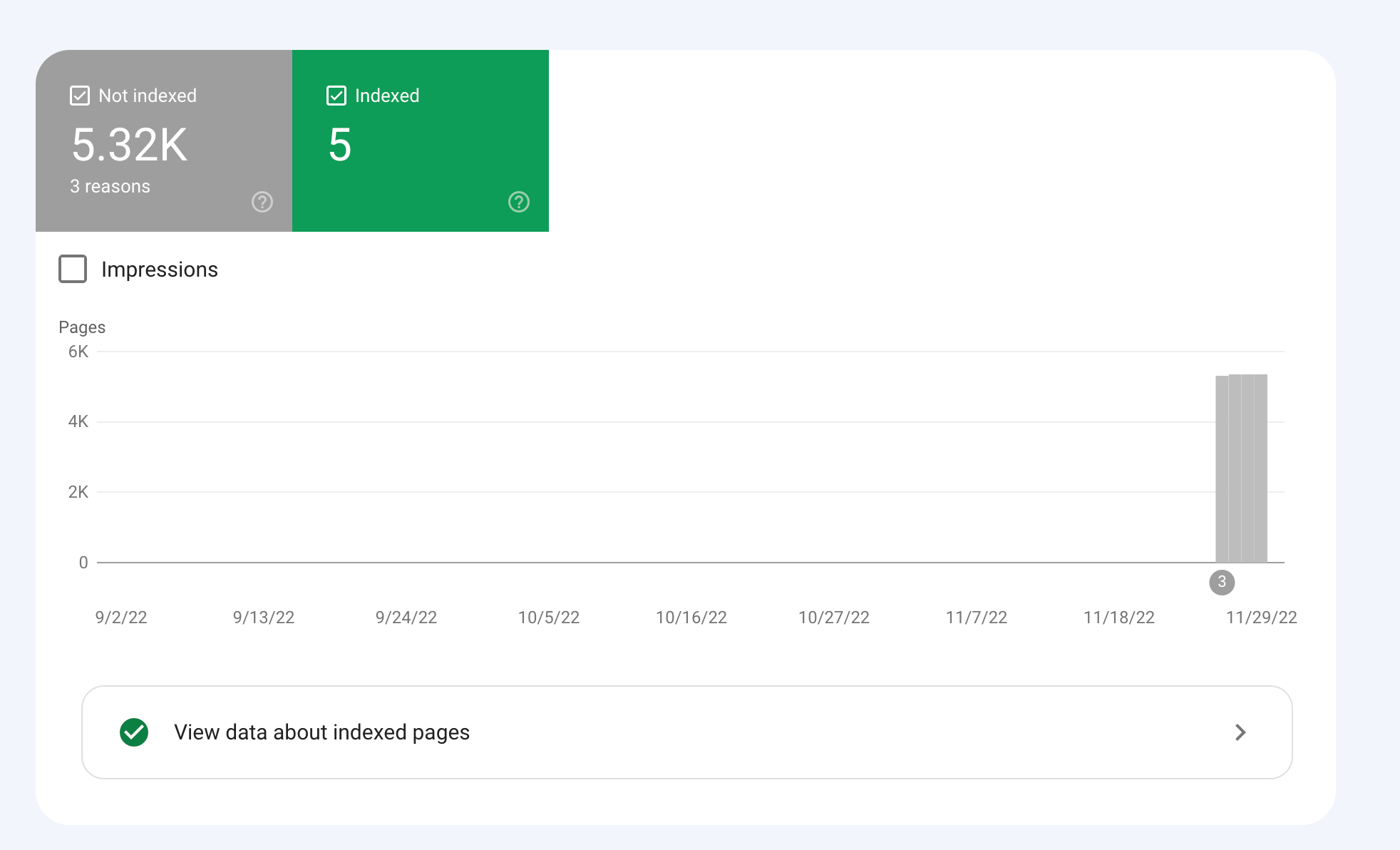Moz Q&A is closed.
After more than 13 years, and tens of thousands of questions, Moz Q&A closed on 12th December 2024. Whilst we’re not completely removing the content - many posts will still be possible to view - we have locked both new posts and new replies. More details here.
How to index e-commerce marketplace product pages
-
Hello!
We are an online marketplace that submitted our sitemap through Google Search Console 2 weeks ago. Although the sitemap has been submitted successfully, out of ~10000 links (we have ~10000 product pages), we only have 25 that have been indexed.
I've attached images of the reasons given for not indexing the platform.


How would we go about fixing this?
-
To get your e-commerce marketplace product pages indexed, make sure your pages include unique and descriptive titles, meta descriptions, relevant keywords, and high-quality images. Additionally, optimize your URLs, leverage schema markup, and prioritize user experience for increased search engine visibility.
-
@fbcosta i hve this problem but its so less in my site
پوشاک پاپیون -
I'd appreciate if someone who faced the same indexing issue comes forward and share the case study with fellow members. Pin points steps a sufferer should do to overcome indexing dilemma. What actionable steps to do to enable quick product indexing? How we can get Google's attention so it can start indexing pages at a quick pace? Actionable advice please.
-
There could be several reasons why only 25 out of approximately 10,000 links have been indexed by Google, despite successfully submitting your sitemap through Google Search Console:
Timing: It is not uncommon for indexing to take some time, especially for larger sites with many pages. Although your sitemap has been submitted, it may take several days or even weeks for Google to crawl and index all of your pages. It's worth noting that not all pages on a site may be considered important or relevant enough to be indexed by Google.
Quality of Content: Google may not index pages that it considers low-quality, thin or duplicate content. If a significant number of your product pages have similar or duplicate content, they may not be indexed. To avoid this issue, make sure your product pages have unique, high-quality content that provides value to users.
Technical issues: Your site may have technical issues that are preventing Google from crawling and indexing your pages. These issues could include problems with your site's architecture, duplicate content, or other issues that may impact crawling and indexing.
Inaccurate Sitemap: There is also a possibility that there are errors in the sitemap you submitted to Google. Check the sitemap to ensure that all the URLs are valid, the sitemap is up to date and correctly formatted.
To troubleshoot this issue, you can check your site's coverage report on Google Search Console, which will show you which pages have been indexed and which ones haven't. You can also check your site's crawl report to see if there are any technical issues that may be preventing Google from crawling your pages. Finally, you can also run a site audit to identify and fix any technical issues that may be impacting indexing.
-
@fbcosta As per my experience, if your site is new it will take some time to index all of the URLs, and the second thing is, if you have Hundreds of URLs, it doesn't mean Google will index all of them.
You can try these steps which will help in fast indexing:
- Sharing on Social Media
- Interlinking from already indexed Pages
- Sitemap
- Share the link on the verified Google My Business Profile (Best way to index fast). You can add by-products or create a post and link it to the website.
- Guest post
I am writing here for the first time, I hope it will help

Got a burning SEO question?
Subscribe to Moz Pro to gain full access to Q&A, answer questions, and ask your own.
Browse Questions
Explore more categories
-
Moz Tools
Chat with the community about the Moz tools.
-
SEO Tactics
Discuss the SEO process with fellow marketers
-
Community
Discuss industry events, jobs, and news!
-
Digital Marketing
Chat about tactics outside of SEO
-
Research & Trends
Dive into research and trends in the search industry.
-
Support
Connect on product support and feature requests.
Related Questions
-
How Can I influence the Google Selected Canonical
Our company recently rebranded and launched a new website. The website was developed by an overseas team and they created the test site on their subdomain. The only problem is that Google crawled and indexed their site and ours. I noticed Google indexed their sub domain ahead of our domain and based on Search Console it has deemed our content as the duplicate of theirs and the Google selected theirs as the canonical.
Community | | Spaziohouston
The website in question is https://www.spaziointerni.us
What would be the best course of action to get our content ranked and selected instead of being marked as the duplicate?
Not sure if I have to modify the content to make it more unique or have them submit a removal in their search console.
Our indexed pages continue to go down due to this issue.
Any help is greatly appreciated.1 -
Unsolved how to add my known backlinks manually to moz
hello
Moz Local | | icogems
i have cryptocurrency website and i found backlinks listed in my google webmasters dashboard, but those backlinks dont show in my moz dashboard even after 45 days. so my question is can i add those backlinks to moz, just to check my website real da score thanks,0 -
Escort directory page indexing issues
Re; escortdirectory-uk.com, escortdirectory-usa.com, escortdirectory-oz.com.au,
Technical SEO | | ZuricoDrexia
Hi, We are an escort directory with 10 years history. We have multiple locations within the following countries, UK, USA, AUS. Although many of our locations (towns and cities) index on page one of Google, just as many do not. Can anyone give us a clue as to why this may be?0 -
Unsolved error in crawling
hello moz . my site is papion shopping but when i start to add it an error appears that it cant gather any data in moz!! what can i do>???
Moz Tools | | valigholami13860 -
Collections or blog posts for Shopify ecommerce seo?
Hi, hope you guys can help as I am going down a rabbit hole with this one! We have a solid-ranking sports nutrition site and are building a new SEO keyword strategy on our Shopify built store. We are using collections (categories) for much of the key product-based seo. This is because, as we understand it, Google prioritises collection/category pages over product pages. Should we then build additional collection pages to rank for secondary product search terms that could fit a collection page structure (eg 'vegan sports nutrition'), or should we use blog posts to do this? We have a quality blog with good unique content and reasonable domain authority so both options are open to us. But while the collection/category option may be best for SEO, too many collections/categories could upset our UX. We have a very small product range (10 products) so want to keep navigation fast and easy. Our 7 lead keyword collection pages do this already. More run the risk of upsetting ease/speed of site navigation. On the other hand, conversion rate from collection pages is historically much better than blog pages. We have made major technical upgrades to the blog to improve this but these are yet to be tested in anger. So at the heart of it all - do you guys recommend favouring blog posts or collection/category pages for secondary high sales intent keywords? All help gratefully received - thanks!
SEO Tactics | | WP332 -
URLs dropping from index (Crawled, currently not indexed)
I've noticed that some of our URLs have recently dropped completely out of Google's index. When carrying out a URL inspection in GSC, it comes up with 'Crawled, currently not indexed'. Strangely, I've also noticed that under referring page it says 'None detected', which is definitely not the case. I wonder if it could be something to do with the following? https://www.seroundtable.com/google-ranking-index-drop-30192.html - It seems to be a bug affecting quite a few people. Here are a few examples of the URLs that have gone missing: https://www.ihasco.co.uk/courses/detail/sexual-harassment-awareness-training https://www.ihasco.co.uk/courses/detail/conflict-resolution-training https://www.ihasco.co.uk/courses/detail/prevent-duty-training Any help here would be massively appreciated!
Technical SEO | | iHasco0 -
How to deal with duplicated content on product pages?
Hi, I have a webshop with products with different sizes and colours. For each item I have a different URL, with almost the same content (title tag, product descriptions, etc). In order to prevent duplicated content I'am wondering what is the best way to solve this problem, keeping in mind: -Impossible to create one page/URL for each product with filters on colour and size -Impossible to rewrite the product descriptions in order to be unique I'm considering the option to canonicolize the rest of de colours/size variations, but the disadvantage is that in case the product is not in stock it disappears from the website. Looking forward to your opinions and solutions. Jeroen
Technical SEO | | Digital-DMG0